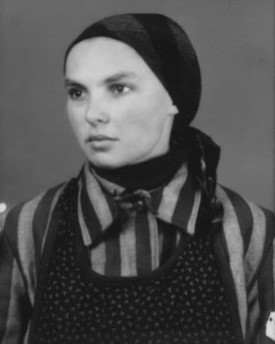Bela Ya’ari Hazan – Resistance Courier
Born: December 1922, Rozhysche, Poland
Died: January 18, 2004, Jerusalem, Israel
Bela Hazan was courier for the Jewish resistance in Poland during World War II.
Bela Hazan’s parents raised her and her siblings in a Hebrew-speaking household, though her father died when she was six years old. After completing elementary school, Hazan attended a vocational school in Kowel and earned money as a private Hebrew tutor. As a teenager, she became a member of the He-Halutz ha-Za’ir-Dror Zionist youth movement.
Hazan began serving as a combat instructor at a kibbutz in the city of Bedzin in 1939. Three months later, war broke out. By late September, Poland had been occupied and divided between Germany and the Soviet Union. In October of 1940, Bela fled to Lithuania with a group of Jewish men. They were captured by Russian soldiers when crossing the German/Soviet border. Though it took weeks, the group was eventually released. They reached Vilna on December 31st.
The Germans arrived in Vilna in 1941 and began their systematic murder of the city’s Jewish population. Hazan obtained the passport of her Polish friend, Bronislawa Limanowska. After switching the photo for her own, Bela assumed this new identity for the rest of the war. She carried a Christian prayer book. She attended church. She maintained a public façade while working as a courier, facilitating contact between resistance hubs in Vilna, Grodno, and Bailystok.
Hazan smuggled messages, weapons, people, and money. She began working as an interpreter for the Gestapo (the Nazi police force) and was given Polish identity papers and traveling permits. She forged documents with stationery she stole from the Gestapo. Bela Hazan’s friends Tema Sznajderman and Lonka Korzybrodska, also assumed Polish identities. They were part of a larger group, made up mostly of women, who put their lives on the line as couriers for the resistance.
In June 1942, Hazan was sent to Warsaw. She was to find information about Lonka, who had gone missing, and deliver two handguns and an informational bulletin. She was arrested at a border crossing, taken to a detention camp, and interrogated. Her Jewish identity was never discovered by the Nazis, but they still suspected her of being part of the resistance.
Hazan was transferred to the Gestapo headquarters in Warsaw, tortured, and imprisoned at Pawiak. There, she found Lonka, who had also been arrested. The two women were transferred to a camp in Birkenau and forced to perform harsh physical labor. Both Bela and Lonka became ill with Typhus, but only Bela survived. According to Bela’s son, Lonka’s last words to his mother were “You will survive, and you will tell our story.”
In 1944, Hazan was transferred to a women’s camp located outside Auschwitz. When Auchwitz was evacuated, she was forced to march four days to Germany. She was transferred to three more concentration camps before she was finally liberated on April 19, 1945. Throughout her time at the camps, Hazan contributed to Underground efforts to save lives despite facing starvation, illness, and abuse.
Bela Hazan spent time at an American hospital in Germany, then traveled to Paris, finally shedding the identity of Bronislawa Limanowska. She briefly relocated to Italy, serving as a teacher for young, orphaned girls. After that, she lived in Kibbutz Givat Brenner in Israel where she wrote her memoir. It wouldn’t be published until 1991, in a book titled They Called Me Bronislawa.
Bel Hazan married Haim Ya’ari in 1946. They had two children after moving to Tel Aviv. She passed away in 2004. In 2019, she was posthumously awarded the “Jewish Rescuer Citation”, an award given by the B’nai B’irth International organization in recognition of “devotion, courage and heroism exhibited in rescuing fellow Jews during the Holocaust."
References:
Brabant, Malcolm. “New Book Explores the Heroic Women-Run Resistance inside Nazi Death Camps.” PBS, Public Broadcasting Service, 8 Apr. 2021, www.pbs.org/newshour/show/new-book-explores-the-heroic-women-run-resistance-inside-nazi-death-camps.
Margit, Maya. “Hidden Heroes: How Young Jewish Women Fought the Nazis.” The Media Line, 27 Jan. 2022, themedialine.org/top-stories/hidden-heroes-how-young-jewish-women-fought-the-nazis.
“Sharing Stories Inspiring Change.” Jewish Women’s Archive, jwa.org/taxonomy/term/15407.
Keywords:
Justice, Wartime, Courage, Perseverance, Responsibility, Selflessness, Take Risks for Others, Stand Up for Your Beliefs
View Discovery Award projects about this Unsung Hero:
Bela Ya’ari Hazan - Discovery Award 2024
- Collections: Art Gallery, Unsung Heroes

